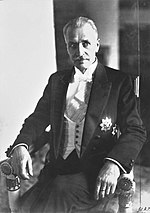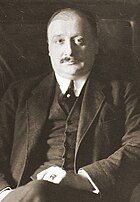1926 Polish presidential elections
|
| |||||||||||||||||
May election | |||||||||||||||||
| |||||||||||||||||
| |||||||||||||||||
| |||||||||||||||||
June election | |||||||||||||||||
| |||||||||||||||||
| |||||||||||||||||
| |||||||||||||||||

Two presidential elections were held in Poland in 1926. They followed the May Coup, which forced President Stanisław Wojciechowski and Prime Minister Wincenty Witos to resign and gave effective power to coup leader, Marshal Józef Piłsudski.
According to then Constitution President was elected by joint houses of Sejm and Senate (National Assembly).
31 May
[edit]There were two candidates: Piłsudski and supported by the National Democracy, Christian Democracy and Piast Adolf Bniński, Voivode of Poznań. Several other politicians were mentioned to run, most notably ousted President Wojciechowski, Sejm Marshal and now Acting President Maciej Rataj (Polish People's Party "Piast") and Senate Marshal Wojciech Trąmpczyński (National Democracy), but they declined to run.
Piłsudski was endorsed by left-wing groups and Biński was endorsed by National Democracy.
Piłsudski defeated Biński in a single round:
| Candidate | Votes | % |
|---|---|---|
| Józef Piłsudski | 292 | 60.21 |
| Adolf Bniński | 193 | 39.79 |
| Total | 485 | 100.00 |
However, following his election, Piłsudski refused to accept the presidency.
1 June
[edit]Pro-Piłsudskiite candidate selection
[edit]| Ignacy Mościcki | |||||||||||||||||||||||||||||
|---|---|---|---|---|---|---|---|---|---|---|---|---|---|---|---|---|---|---|---|---|---|---|---|---|---|---|---|---|---|
| Chemist | |||||||||||||||||||||||||||||
| Potential candidates | ||||||||||
|---|---|---|---|---|---|---|---|---|---|---|
| Ignacy Mościcki | Artur Śliwiński | Zdzisław Lubomirski | Marian Zdziechowski | |||||||
| Chemist | Prime Minister of Poland (1922) |
Mayor of Warsaw (1916-1917) |
Philosopher | |||||||
Following Piłsudski's refusal to accept the mantle of the presidency, four candidates were considered to replace him: Artur Śliwiński, Zdzisław Lubomirski, Ignacy Mościcki and Marian Zdziechowski. Śliwiński was a former Prime Minister, who failed to form a government with confidence of the Sejm, by 1926 he had become the director of the City Theater in Warsaw. Lubomirski and Zdziechowski, the most serious rivals to Mościcki, belonged to the "old conservative" movement. Lubomirski was a former Mayor of Warsaw and leader of the Regency Council in the Regency Kingdom of Poland, while Zdziechowski was a famous professor and political thinker. The possibility of their candidacies was eclipsed by Mościcki due to the initiative of incumbent Prime Minister Kazimierz Bartel. Mościcki was rather inexperienced in politics, as he was primarily a professional chemist. His political experience was limited to being a rank and file member in the illegal Polish socialist movement during the 19th century in the Russian partition, so he was assumed to be mostly a loyalist to Piłsudski.[1]
Election
[edit]The Polish Socialist Party, who had previously supported Piłsudski, filed their candidate - Sejm Caucus Chair Zygmunt Marek, a man who had officially nominated Piłsudski a day earlier. Bniński ran again.
| Candidate | First round | Second round | ||
|---|---|---|---|---|
| Votes | % | Votes | % | |
| Ignacy Mościcki | 215 | 44.61 | 281 | 58.30 |
| Adolf Bniński | 211 | 43.78 | 200 | 41.49 |
| Zygmunt Marek | 56 | 11.62 | 1 | 0.21 |
| Total | 482 | 100.00 | 482 | 100.00 |
Mościcki accepted his election.
References
[edit]- Zygmunt Kaczmarek, Trzej prezydenci II Rzeczypospolitej, Instytut Wydawniczy Związków Zawodowych, Warszawa 1988
- ^ Cat-Mackiewicz, Stanisław (2012). Historia Polski od 11 listopada 1918 do 17 września 1939. Universitas. ISBN 97883-242-3740-1.







